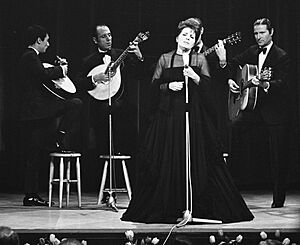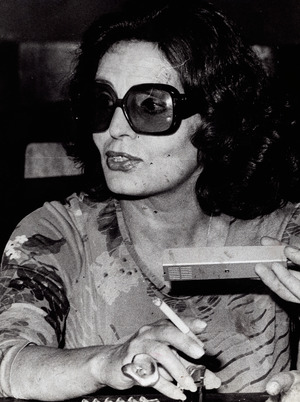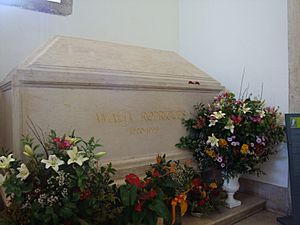Amália Rodrigues facts for kids
Quick facts for kids
|
|
|---|---|
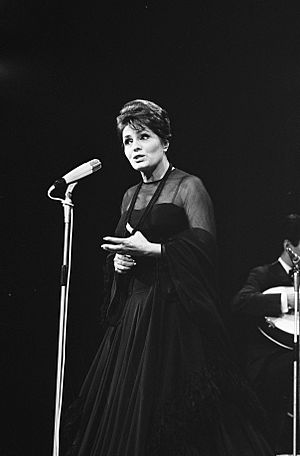
Amália Rodrigues, 1969
|
|
| Background information | |
| Birth name | Amália da Piedade Rebordão Rodrigues |
| Also known as | Rainha do Fado (Queen of Fado) |
| Born | 23 July 1920 |
| Origin | Lisbon, Portugal |
| Died | 6 October 1999 (aged 79) |
| Genres | Fado |
| Occupation(s) |
|
| Instruments |
|
| Years active | 1939–1999 |
| Labels | Valentim de Carvalho |
Amália da Piedade Rebordão Rodrigues (born 23 July 1920 – died 6 October 1999) was a famous Portuguese singer. She was known as Amália Rodrigues or simply Amália.
People called her the 'Rainha do Fado' (which means "Queen of Fado"). She helped make fado music popular all over the world. Amália traveled a lot during her career. She is still the best-selling Portuguese artist ever.
Contents
Amália's Early Life and Music Beginnings
Amália Rodrigues was born in Pena, a part of Lisbon, Portugal. Her official birthday is July 23, but she always said it was July 1, 1920. Her family was not rich. She grew up doing small jobs, like selling fruit by the river in Lisbon.
Starting Her Singing Career
Amália began singing around 1935. Her first professional show was in 1939. She also performed in stage shows.
Around this time, she met Frederico Valério. He was a composer who wrote many songs just for her. These songs often had orchestral music. Some of them were 'Fado do Ciúme' and 'Ai Mouraria'.
By the early 1940s, Amália was very famous in Portugal. She also started acting in movies. Her first film was 'Capas Negras' in 1946. Her most famous movie was 'Fado' in 1947.
She became popular in Spain, Brazil, and Paris. In 1950, she sang the song 'April in Portugal' (originally called "Coimbra") for international audiences. This helped her become known worldwide.
In the early 1950s, famous poets started writing songs for her. This was a new and important part of her career.
Becoming a Global Star
Traveling the World to Perform
Amália Rodrigues first traveled abroad to sing in 1943. She performed in Madrid, Spain. In 1945, she sang in Brazil and made her first recordings there. She also performed in Berlin in 1950.
She was the first Portuguese artist to appear on American TV in 1953. She sang at the Mocambo club in Hollywood in 1954.
Amália also appeared in the French film The Lovers of Lisbon. She was very popular in France, almost as much as in Portugal. She performed at the famous Olympia hall in Paris many times. This led to a live album called Portugal's Great Amália Rodrigues Live at the Olympia Theatre in Paris in 1957.
In the 1950s and 1960s, she often appeared on French television. A French songwriter named Charles Aznavour even wrote a fado song for her. She also made French versions of her own songs.
In 1962, she released a new album called Amália Rodrigues. She worked with French composer Alain Oulman on this album. He became her main songwriter. She also started singing her own poems, like 'Estranha Forma de Vida'. This album featured some of her most famous songs, such as 'Povo Que Lavas no Rio' and 'Maria Lisboa'.
She continued to perform in many countries. She sang in Israel, the UK, France, and returned to the US in 1966 and 1968. She also performed in the former USSR and Romania.
More Acting Roles

Amália kept acting in movies like 'Sangue Toureiro' (1958) and 'Fado Corrido' (1964).
She also appeared in the 1964 film The Enchanted Islands. In 1965, she recorded an album of poems by the 16th-century poet Luís de Camões. Her song Vou dar de beber à dor in 1968 sold a record number of copies. Her 1970 album Com que voz won many international awards.
Amália won Portugal's Best Film Actress award twice. First for 'Fado' in 1947, and again in 1965 for a movie where she didn't sing.
She also tried other music styles. She recorded old songs with an orchestra. She made an album with jazz saxophonist Don Byas. She even recorded an album of American songs called 'Amália On Broadway', which included 'Summertime'.
Her album 'Com Que Voz' (1969) was very important. It had many of her successful songs and new ones. Amália was at her best during the 1960s.
Her Later Years and Legacy
In the 1970s, Amália focused on live concerts. After the Carnation Revolution in 1974, she faced some unfair accusations. These made her very sad.
Amália had great success in Italy and Japan during the 1970s. She recorded an album of traditional Italian songs called A Una Terra Che Amo (1973). She also made Italian versions of her own songs. Her album Cantigas numa Língua Antiga came out in 1977.
After this, she had some health problems. This meant she had to take a break from performing. She then released two albums with poems she wrote herself: Gostava de Ser Quem Era (1980) and 'Lágrima' (1983).
In the 1980s and 1990s, Amália became a living legend. Her last new studio album was Lágrima in 1983. After that, she released old recordings and "greatest hits" collections.
Health Challenges and Final Performances
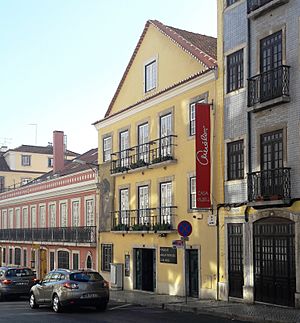
Amália returned to the Olympia in Paris in 1985 for more concerts. From 1985 to 1994, she had huge international success. She performed in many countries, including France, Italy, Japan, and the USA.
In 1990, she celebrated 50 years in music with a big concert in Lisbon. She was honored by the President of Portugal. Even though her voice had changed, it had a new power.
Despite her illnesses, Amália kept recording until 1990. She eventually stopped performing in public. Her career was celebrated with a biography and a TV series about her life. A film about her 1990 concert in New York City was also made.
Amália released her last album of new songs, Obsessão, in 1990. Her very last concert was in December 1994, when she was 74. She had a lung operation in 1995. Many TV shows and tributes honored her. She released an album of old recordings called Segredo (1997) and a book of her poems, Amália: Versos (1997).
In 1998, she was honored at the Universal Exhibition in Lisbon. In 1999, she was named one of Portugal's 25 most important people of the modern era. She also gave her last TV interview.
Her Passing
Amália Rodrigues passed away on October 6, 1999, at age 79, in her Lisbon home. The Portuguese government declared three days of national mourning. Her house is now a museum.
She was given a state funeral, attended by thousands of people. In 2001, she was moved to the National Pantheon. This is a special honor given to the greatest Portuguese figures. She was the first woman to be laid there.
Awards and Honors
Amália Rodrigues received many awards and honors during her life.
 Dame of the Military Order of Saint James of the Sword, Portugal (1958)
Dame of the Military Order of Saint James of the Sword, Portugal (1958) Officer of the Military Order of Saint James of the Sword, Portugal (1971)
Officer of the Military Order of Saint James of the Sword, Portugal (1971) Grand Officer of the Order of Prince Henry, Portugal (1981)
Grand Officer of the Order of Prince Henry, Portugal (1981) Grand-Cross of the Military Order of Saint James of the Sword, Portugal (1990)
Grand-Cross of the Military Order of Saint James of the Sword, Portugal (1990) Grand-Cross of the Order of Prince Henry, Portugal (1998)
Grand-Cross of the Order of Prince Henry, Portugal (1998)
Amália's Lasting Legacy
Amália Rodrigues left behind a foundation called the Amália Rodrigues Foundation. This foundation manages her legacy and assets.
By the time she died, Amália had received over 40 honors from many countries. These included France, Lebanon, Portugal, Spain, Israel, and Japan.
In 2004, a short film about her was released. In 2007, she was voted 14th in a poll of "The Greatest Portuguese." A movie about her life, called Amália, came out in 2008.
Variety magazine once called her one of the voices of the century. She is one of the most famous Portuguese artists and singers in the world. In Portugal, she is a national icon.
She helped make Fado a well-known music style around the globe. Her music still inspires many singers today.
Amália Rodrigues remains one of Portugal's most celebrated artists. She came from a humble family and became a global superstar. Her career lasted 55 years. She recorded songs in many languages, including Portuguese, French, English, Spanish, and Italian. Her songs, like "Coimbra" ("April in Portugal"), were successful in many countries.
Family Life
Amália Rodrigues' parents had nine children, but only five lived to be adults. These were Amália, Celeste, and three brothers. In 1940, she married Francisco Cruz. They divorced in 1946. In 1961, she married César Seabra in Rio de Janeiro. They stayed married until he passed away in 1997.
Discography (Selected Albums)
Amália Rodrigues released many recordings throughout her career. Here are some of her important albums:
- 1957: Amália A L'Olympia
- 1962: Busto
- 1965: Fado português
- 1969: Vou dar de beber à dor
- 1970: Com que voz
- 1973: A una terra che amo
- 1977: Cantigas numa Língua Antiga
- 1983: Lágrima
- 1990: Obsessão
- 1997: Segredo
Images for kids
See also
 In Spanish: Amália Rodrigues para niños
In Spanish: Amália Rodrigues para niños
 | Jewel Prestage |
 | Ella Baker |
 | Fannie Lou Hamer |


